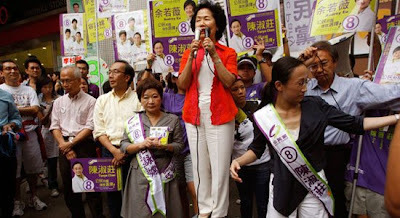 Anson Chan, center, a leading democracy advocate, campaigned for other candidates on Sunday but did not seek re-election.
Anson Chan, center, a leading democracy advocate, campaigned for other candidates on Sunday but did not seek re-election. HONG KONG: Chinese national pride after the Olympics and growing distress over inflation combined to produce a leftward shift in legislative elections here on Sunday. The pro-business Liberal Party lost seats while populists made gains with promises to introduce a minimum wage and reduce pollution.
Most of the pro-democracy legislators kept their seats, despite a low turnout among the middle-class and upper-middle class voters who make up their main support. With most of the votes counted, it appeared that they would retain enough seats to prevent the local government from working with Beijing officials to rewrite the Basic Law, Hong Kong's mini-constitution.
They need to hold at least 21 seats, one-third plus one, in the 60-member Legislature to block such changes. Democracy advocates, particularly those who also addressed economic concerns, won 19 of the 30 seats selected by voting among the general public. They appeared likely to win an additional half-dozen seats among the 30 chosen by business groups, the professions and labor unions.
Political analysts and politicians alike said the results showed a growing sense of Chinese identity among residents of Hong Kong, which was a British colony until its return to China in 1997.
The sense of nationalism that has swept through mainland China this year, during the Olympics and in response to protests in Tibet in the spring, has also been evident here. Flag-waving throngs showed up for the Olympic torch relay here, and the exploits of Chinese athletes at the Games drew rapt attention.
"I do feel a greater sense that Hong Kong is a part of China now, compared to 1997," said Phoenix Yu, a 30-year-old office clerk, before casting her vote in Kowloon.
Three leading figures in the pro-democracy movement Martin Lee, Anson Chan and Sin Chung Kai did not seek re-election. They dropped out to make room for younger politicians, but they also acknowledged how hard it would be for the next Legislature to move any further toward democracy in the coming four-year term in the face of implacable opposition from Beijing and growing support in Hong Kong for close relations with the mainland.
"The national identity in Hong Kong is increasing," Sin said.
The current government of Donald Tsang, Hong Kong's chief executive, retained the support of a majority of the Legislature, though the composition of that support shifted.
Pro-business lawmakers, a mix of independents and Liberal Party members, suffered heavy losses. The Liberal Party's chairman, James Tien, resigned as its leader shortly before it was announced that he had lost his seat.
The Democratic Alliance for the Betterment and Progress of Hong Kong, or DAB, fared better. The most ardently pro-Beijing party, it also favors more government measures to help the poor and to combat pollution.
Accelerating inflation, especially for food and housing, became an acute issue here, as did the widening gap between rich and poor.
Tsang has appointed DAB officials to top government jobs. The party worked closely with mainland officials to expand its grass-roots organization, which helped it draw supporters to polling places even as overall turnout fell, compared with the last legislative election in 2004.
"The DAB is building its strength and is building its organization power in the last few years," said Ivan Choy, a political analyst at Chinese University of Hong Kong.
The party's greater organizational strength paid off with voters like Tam Siao Woon, 77, a retired garment worker. "I don't really follow politics, but I just voted for a DAB candidate, since they kept calling and calling me on the telephone, and chasing me to come down to the polling station to vote for their candidate," she said.
Law Yiu, a 60-year-old Chinese herbal doctor, voted for pro-democracy candidates.
"I don't feel Hong Kong is a part of China," he said. "The Chinese government is merely using the same tricks with the Hong Kong people as they use with the people in China, giving out periodic sweets to the Hong Kong people in an effort to keep them calm and docile."
Related site: Hong Kong Instilling 'Chinese' Identity (IHT, Oct 19 1996)
Question
The CCP has always adopted the "one country two systems" principle in its governance of Hong Kong. With reference to the article, discuss the feeling of Hongkongers towards the Beijing government.


No comments:
Post a Comment